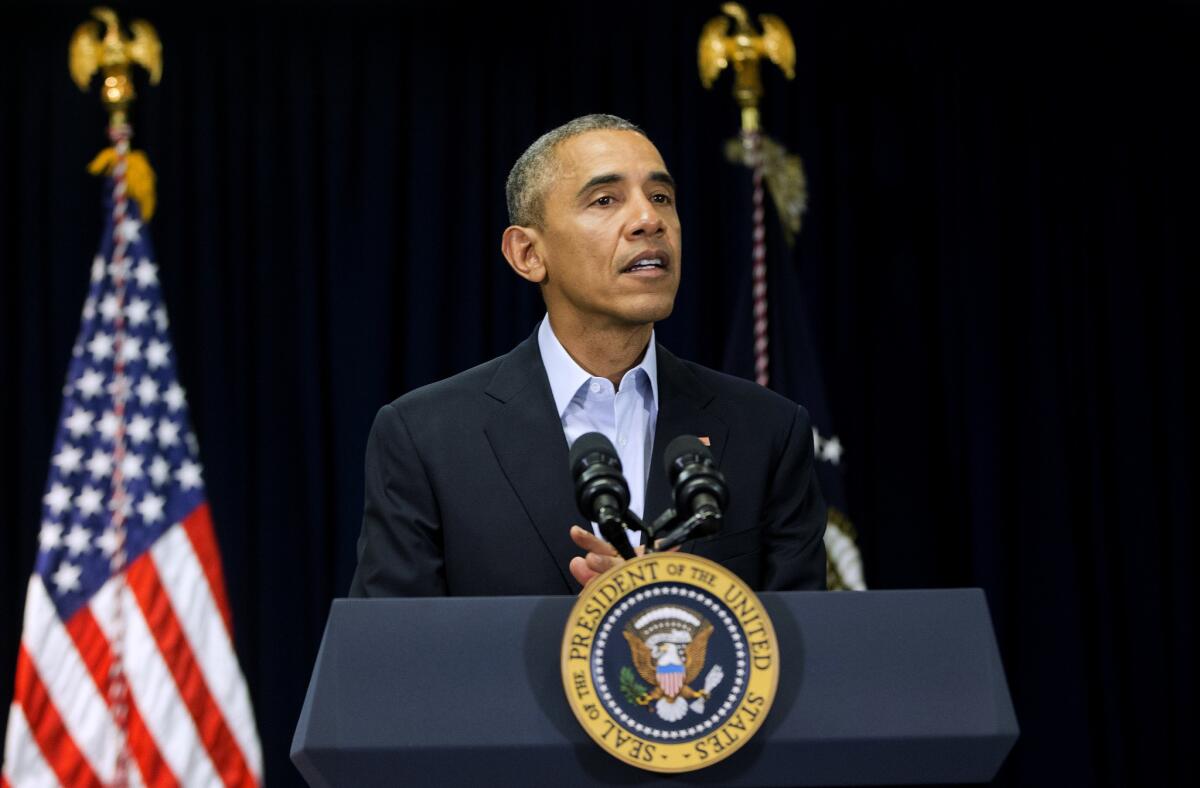Opinion: Obama’s nominee to replace Scalia won’t get a vote -- this year

President Obama speaks to reporters at Omni Rancho Las Palmas in Rancho Mirage Saturday about the death of Supreme Court Associate Justice Antonin Scalia.
The Senate has about as much chance of voting on a new Supreme Court nominee this year as the sun does of rising in the West. But that doesn’t mean said nominee won’t eventually take the seat formerly occupied by Associate Justice Antonin Scalia.
Yes, it’s technically possible that a vote could happen this year. President Obama said Saturday that he would submit a nomination to replace Scalia, who died unexpectedly that morning, because it’s his constitutional responsibility. “There will be plenty of time for me to do so, and for the Senate to fulfill its responsibility to give that person a fair hearing and a timely vote,” Obama said. “These are responsibilities that I take seriously, as should everyone.”
Nevertheless, the nomination will go straight to legislative jail without passing Go or collecting $200. That’s because the Scalia’s death puts the court’s conservative majority at risk, giving President Obama another opportunity to build on his legacy by shifting the balance back toward the court’s liberal wing. And it’s a lock that Obama will nominate someone who will bring about that shift.
In other words, Scalia’s death presents a problem for Republicans that only a Republican president can solve.
That’s the main reason Republicans swiftly called for Scalia’s seat to remain vacant until after the November elections, when the GOP has a chance to elect someone who’ll nominate a jurist with views like Scalia’s.
Senate Majority Leader Mitch McConnell (R-Ky.) minced no words. In a statement released on Twitter shortly after Scalia’s death was announced, McConnell said, “The American people should have a voice in the selection of their next Supreme Court justice. Therefore, this vacancy should not be filled until we have a new president.”
The only questions now are what approach Obama will take when picking a nominee, and whether his choice will effectively bind his would-be successors, Sen. Bernie Sanders and former Secretary of State Hillary Clinton.
Neither side can avoid the whiff of political gamesmanship. But by picking someone with especially compelling credentials, Obama can change the debate from “Why should a lame-duck president fill this seat” to “Why shouldn’t this person be on the court?” The pressure on Congress to act will only be amplified if Obama’s choice is in some way unprecedented or historic -- someone who would be, say, the first Asian American on the court.
Scalia’s death presents a problem for Republicans that only a Republican president can solve.
Not that the pressure would ever be strong enough to lead Congress to confirm Obama’s nominee, or even vote on that person. There’s no upside for Republicans in officially rejecting the nominee, rather than simply ignoring him or her; conservatives already are counting on them not to confirm whoever Obama names, and a rancorous debate could alienate swing voters.
So the safe assumption is that Obama’s nominee won’t even get a formal hearing, let alone a vote. Which brings us to the second question: When Obama pounds on the Senate “to fulfill its responsibility,” as he put it Saturday, will Sanders and Clinton be obligated to throw their support behind Obama’s choice?
It’s hard to see how they couldn’t. Just by making a nomination, Obama puts that person at the top of the list of campaign issues for November. You can hear the debate moderator now, asking the candidates from both sides who they’ll pick to replace Scalia. And if Democrats are flailing Senate Republicans for not voting on Obama’s nominee, how could Sanders or Clinton not pledge to keep fighting for that person if he or she became president?
So, even though it might be hugely disappointing for Sanders or Clinton not to pick their own person to end the conservatives’ lengthy dominance of the Supreme Court, they may find themselves stuck backing the one chosen by their predecessor. And if either one wins in November, there will be no reason for Republicans to put off a vote on Obama’s nominee any longer.
Follow Healey’s intermittent Twitter feed: @jcahealey
More to Read
Sign up for Essential California
The most important California stories and recommendations in your inbox every morning.
You may occasionally receive promotional content from the Los Angeles Times.











